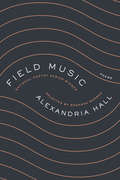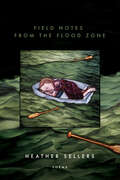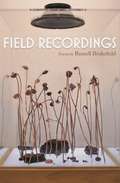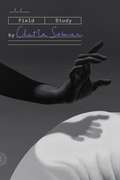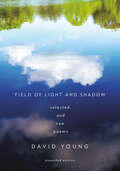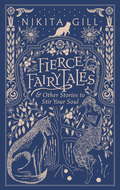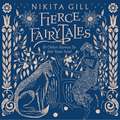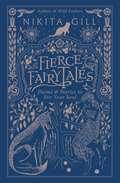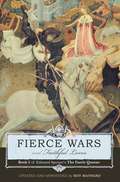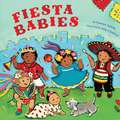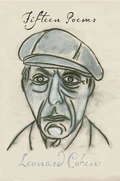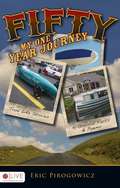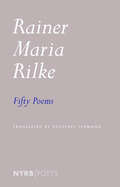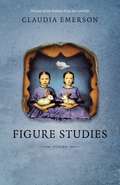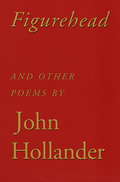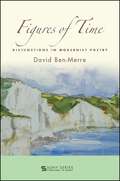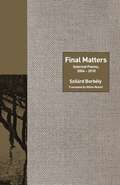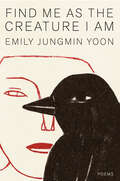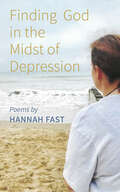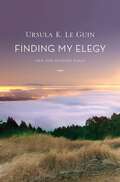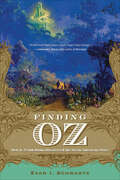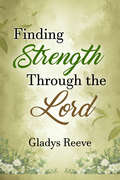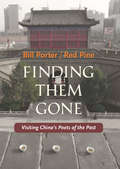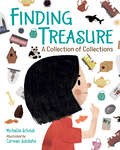- Table View
- List View
Field Music: Poems
by Alexandria HallA collection of poetry from the 2019 winner of the National Poetry Series, selected by Rosanna Warren In her remarkable and assured debut, Alexandria Hall explores the boundaries and limits of language, place, and the self, as well as the complicated space between safety and danger, intimacy and isolation, playfulness and seriousness, home and away. With a keen eye for the importance of place, Hall shows us daily life in rural Vermont, illuminating the beauty and difficulty inherent in the dichotomies of human language and experience.Incisive and tender, Field Music is a thoughtful and alert collection from a major emerging voice.
Field Notes from the Flood Zone (American Poets Continuum Series #192)
by Heather SellersFrom the frontlines of climate catastrophe, a poet watches the sea approach her doorstep. Born and raised in Florida, Heather Sellers grew up in an extraordinarily difficult home. The natural world provided a life-giving respite from domestic violence. She found, in the tropical flora and fauna, great beauty and meaningful connection. She made her way by trying to learn the name of every flower, every insect, every fish and shell and tree she encountered. That world no longer exists. In this collection of poems, Sellers laments its loss, while observing, over the course of a year, daily life of the people and other animals around her, on her street, and in her low-lying coastal town, where new high rises soar into the sky as the storm clouds gather with increasing intensity and the future of the community—and seemingly life as we know it—becomes more and more uncertain. Sprung from her daily observation journals, haunted by ghosts from the past, Field Notes from the Flood Zone is a double love letter: to a beautiful and fragile landscape, and to the vulnerable young girl who grew up in that world. It is an elegy for the two great shaping forces in a life, heartbreaking family struggle and a collective lost treasure, our stunning, singular, desecrated Florida, and all its remnant beauty.
Field Recordings (Made in Michigan Writers Series)
by Russell BrakefieldFirmly rooted in the dramatic landscapes and histories of Michigan, Field Recordings uses American folk music as a lens to investigate themes of personal origin, family, art, and masculinity. The speakers of these poems navigate Michigan’s folklore and folkways while exploring more personal connections to those landscapes and examining the timeless questions that occupy those songs and stories. With rich musicality and lyric precision, the poems in Field Recordings look squarely at what it means to be a son, a brother, an artist, a person. Inspired by the life and writings of famous ethnomusicologist Alan Lomax, Field Recordings is divided into three sections. It is anchored by a long poem that tracks Alan Lomax on his 1938 journey through Michigan collecting music for the Library of Congress. This poem speaks to the complex process of recording the voices and stories of working-class musicians in Michigan in the early part of the twentieth century. It is rich with the pleasures of music and storytelling and is steeped in history. Like the rest of the collection, it also speaks to the questions and anxieties that, like music, transcend time and technology. In poems alternately elegiac and rhapsodic, Field Recordings explores the way art is produced and translated, the line between innovation and appropriation, and the complex, beautiful stories that are passed between us. From poetry readers to poets, music fans to musicians, this collection will undoubtedly appeal to a wide audience.
Field Study
by Chet'la SebreeWinner of the 2020 James Laughlin Award from the Academy of American Poets"Layered, complex, and infinitely compelling, Chet’la Sebree’s Field Study is a daring exploration of the self and our interactions with others—a meditation on desire, race, loss and survival." --Natasha Trethewey, Pulitzer Prize-winning author of Memorial DriveChet’la Sebree’s Field Study is a genre-bending exploration of black womanhood and desire, written as a lyrical, surprisingly humorous, and startlingly vulnerable prose poemI am society’s eraser shards—bits used to fix other people’s sh*t, then discarded. Somehow still a wet nurse, from actual babes to Alabama special elections.Seeking to understand the fallout of her relationship with a white man, the poet Chet’la Sebree attempts a field study of herself. Scientifically, field studies are objective collections of raw data, devoid of emotion. But during the course of a stunning lyric poem, Sebree’s control over her own field study unravels as she attempts to understand the depth of her feelings in response to the data of her life. The result is a singular and provocative piece of writing, one that is formally inventive, playfully candid, and soul-piercingly sharp. Interspersing her reflections with Tweets, quips from TV characters, and excerpts from the Black thinkers—Audre Lorde, Maya Angelou, Tressie McMillan Cottom—that inspire her, Sebree analyzes herself through the lens of a society that seems uneasy, at best, with her very presence. She grapples with her attraction to, and rejection of, whiteness and white men; probes the malicious manifestation of colorism and misogynoir throughout American history and media; and struggles with, judges, and forgives herself when she has more questions than answers. “Even as I accrue these notes,” Sebree writes, “I’m still not sure I’ve found the pulse.”A poem of love, heartbreak, womanhood, art, sex, Blackness, and America—sometimes all at once—Field Study throbs with feeling, searing and tender. With uncommon sensitivity and precise storytelling, Sebree makes meaning out of messiness and malaise, breathing life into a scientific study like no other.
Field of Light and Shadow: Selected and New Poems
by David YoungA career-spanning volume from one of our most valuable living American poets, offering poems that display an exquisite ear tuned to the natural world, to love and friendship, and to the continually renewable possibilities of language. David Young's settings are at once local and universal--an adolescence in Omaha, late summer on Lake Erie, a sleepless night in the backyard during a meteor shower. He moves with dazzling ease between culture and nature, between the literary and the philosophical, microcosm and macrocosm. Here are poems on Osip Mandelstam and Chairman Mao, the meaning of boxcars on the track, the beautiful names of the months, and a fox at the field's edge, charged in each case by Young's fierce intelligence and candor in the face of grief and loss."We float through space. Days pass," Young writes in "The Portable Earth-Lamp." "Sometimes we know we are part of a crystal / where light is sorted and stored." His metaphysical reach, balancing remarkable humility with penetrating vision, is one of the great gifts of this exemplary career in poetry.From the Hardcover edition.
Fierce Fairytales: & Other Stories to Stir Your Soul
by Nikita GillFor readers who enjoyed Goodnight Stories for Rebel Girls, this empowering collection of stories, poems and beautiful hand-drawn illustrations gives Once Upon a Time a much-needed modern makeover. Gone are the gender stereotypes of obliging lovers, violent men and girls that need rescuing. Instead, lines blur between heroes and villains and you'll meet brave princesses, a new kind of wolf lurking in the concrete jungle and a courageous Gretel who can bring down monsters on her own.
Fierce Fairytales: & Other Stories to Stir Your Soul
by Nikita GillTraditional fairytales are full of cliché and gender stereotypes. The silent Rapunzel, the beautiful sweet princesses, ugly jealous and bitter women, girls that need rescuing, men who take the glory and their new brides being forever grateful and subservient. Good mothers, obliging lovers and pretty objects. Nikita Gill's new prose and poetry collection rewrites the fairytale classics, and reworks their old-fashioned tropes into new empowering and inspirational stories. Meet the grief-stricken Ursula, the troubled Wendy Darling, the wolf in the concrete jungle and the courageous Gretel who can bring down monsters on her own.Read by Nikita Gill(p) Orion Publishing Group 2018
Fierce Fairytales: Poems and Stories to Stir Your Soul
by Nikita GillPoet, writer, and Instagram sensation Nikita Gill returns with a collection of fairytales poetically retold for a new generation of women. Traditional fairytales are rife with cliches and gender stereotypes: beautiful, silent princesses; ugly, jealous, and bitter villainesses; girls who need rescuing; and men who take all the glory. But in this rousing new prose and poetry collection, Nikita Gill gives Once Upon a Time a much-needed modern makeover. Through her gorgeous reimagining of fairytale classics and spellbinding original tales, she dismantles the old-fashioned tropes that have been ingrained in our minds. In this book, gone are the docile women and male saviors. Instead, lines blur between heroes and villains. You will meet fearless princesses, a new kind of wolf lurking in the concrete jungle, and an independent Gretel who can bring down monsters on her own. Complete with beautifully hand-drawn illustrations by Gill herself, Fierce Fairytales is an empowering collection of poems and stories for a new generation.
Fierce Voice / Voz feroz: Contemporary Women Poets from Argentina and Uruguay
by Curtis Bauer, Lisa Rose Bradford, and Jesse Lee KerchevalA bilingual anthology, Fierce Voice / Voz feroz features Argentine and Uruguayan women poets published after their countries’ return to democracy in the eighties. These twenty-six poets introduced innovative, invigorating styles and established new directions in literature, providing an essential addition to the development of Latin American poetry. This anthology includes established poets as well as emerging poets just gaining attention in their countries and abroad. Fierce Voice / Voz feroz serves to showcase their work and give an English-speaking readership the opportunity to experience the breadth and power of this fierce talent.PoetsDiana BellessiAmanda BerenguerJuana BignozziSelva CasalLaura Cesarco EglinRaquel GarzónMarosa di GiorgioIrene GrussSilvia GuerraMaría Rosa LojoVirginia LucasLiliana LukinMelisa MachadoClaudia MaglianoCirce MaiaClara MuschiettiMaría NegroniMariella NigroTatiana OroñoOlga OrozcoMercedes RofféMirta RosenbergBeatriz VignoliIdea VilariñoLaura WittnerTranslatorsCurtis Bauer Lisa Rose Bradford Mary Crow Kristin DykstraRichard GwynKatherine M. HedeenJen HoferCatherine Jagoe Jesse Lee Kercheval Ruth Llana Seth Michelson Michelle Gil-Montero Anna Deeny MoralesJeannine Marie Pitas Louise B. Popkin Bret Sanders Madeleine Stratford
Fierce Wars And Faithful Loves (The Fairie Queene #1)
by Edmund Spenser Roy MaynardDespite all of his acknowledged greatness, almost no one reads Edmund Spenser (1552-99) anymore. Roy Maynard takes the first book of the 'Faerie Queene, ' exploring the concept of Holiness with the character of the Redcross Knight, and makes Spenser accessible again. <P><P>He does this not by dumbing it down, but by deftly modernizing the spelling, explaining the obscurities in clever asides, and cuing the reader towards the right response. In today's cultural, aesthetic, and educational wars, Spenser is a mighty ally for twenty-first century Christians. Maynard proves himself a worthy mediator between Spenser's time and ours. (Gene Edward Veith)
Fifteen Poems
by Leonard Cohen<P>This selection of poems by Leonard Cohen, one of the most acclaimed singer-songwriters in the world, is accompanied by twenty-four of his striking and provocative drawings. <P>Cohen first made his name as a poet more than half a century ago and since then his achievements in poetry and music have made him an internationally revered figure. These fifteen poems, including "Death of a Lady's Man," "On Hearing a Name Long Unspoken," and "The Embrace," are drawn from across his remarkable career and appear here for the first time with his illustrations. With its lyrical intensity and sensual immediacy, Fifteen Poems offers a potent distillation of the genre-crossing genius of one of the most admired artists of our time.
Fifty ... My One Year Journey: True Life Stories, Historical Facts, and Poems
by Eric PirogowiczCome with me on this amazing one-year journey as I enter my first year of being 50. Enjoy unpredictable events as they happened, walk with me on the picket line in Picket Fences and learn about family traditions in Can of Thanks. These true-life stories will hit your funny bone, bring you to tears, and warm your heart. Learn historical facts about the All-American Soap Box Derby, check out the giant Goodyear Air Dock where many blimps were built, or visit Lock 3 and step back in time to the Canal Era. Enjoy this reading experience!
Fifty Poems
by Rainer Maria RilkeFresh, beautiful new translations of one of the most important poets of all time, publishing in celebration of the 150th anniversary of Rainer Maria Rilke's birth.Rilke is one of the greatest poets of the twentieth century, revered throughout the world. Geoffrey Lehmann has selected fifty of Rilke&’s finest poems from the two volumes of New Poems, considered the center of gravity of Rilke&’s achievement. Lehmann&’s refined ear and perfect mastery of English verse form give his renderings of Rilke a precision and poise equal to that of the German originals. In celebration of the 150th anniversary of Rilke&’s birth, a master poet lives anew.
Figure Studies: Poems (Southern Messenger Poets)
by Claudia EmersonPoet Claudia Emerson begins Figure Studies with a twenty-five-poem lyric sequence called "All Girls School," offering intricate views of a richly imagined boarding school for girls. Whether focused on a lesson, a teacher, or the girls themselves as they collectively "school" -- or refuse to -- the poems explore ways girls are "trained" in the broadest sense of the word."Gossips," the second section, is a shorter sequence narrated by women as they talk about other women in a variety of isolations; these poems, told from the outside looking in, highlight a speculative voicing of all the gossips cannot know. In "Early Lessons," the third section, children narrate as they also observe similarly solitary women, the children's innocence allowing them to see in farther than the gossips can. The fourth section offers studies of women and men in situations in which gender, with all of its complexities, figures powerfully.The follow-up to the Pulitzer Prize-winning collection Late Wife, Figure Studies upholds Emerson's place among contemporary poetry's elite.The Mannequin above Main Street MotorsWhen the only ladies' dress shop closed, she was left on the street for trash, unsalvageable, one arm missing, lost at the shoulder, one leg at the hip. But she was wearing a blue-sequined negligee and blonde wig, so they helped themselves to her on a lark -- drunken impulse -- and for years kept her leaning in a corner, beside an attic window, rendered invisible. The dusk was also perpetual in the garage below,punctuated only by bare bulbs hung close over the engines. An oily grime coated the walls, and a decade of calendars promoted stock-car drivers, women in dated swimsuits, even their bodies out of fashion. Radio distorted there; cigarette smoke moaned, the pedal steel conceding to that place a greater, echoing sorrow. So, lame, forgotten prank, she remained,back turned forever to the dark storagebehind her, gaze leveled just above anyone's who could have looked up to mistake in the cast of her face fresh longing -- her expression still reluctant figure for it.
Figurehead: Other Poems
by John HollanderIn a major review in The New Republic of John Hollander's two earlier books, Tesserae and Selected Poetry (both 1993), Vernon Shetley said, "John Hollander's poetry has shown a visionary power just often enough to secure him a place as one of the major figures of our moment." Figurehead, a lively, varied, and technically dazzling book, confirms the statement made by Henry Taylor in the Washington Times: "John Hollander revels in technical challenges of unusual severity and complexity, yet most of his poems also have the emotional heft of something worth pausing over and remembering." One of the most gifted of W. H. Auden's choices for the Yale Series of Younger Poets, Hollander has pursued the wide range and metrical brilliance of Auden's own poetry, so that this new book exhibits both a large compass of subject matter (from philosophical matters to personal narrative) and, as usual, some astonishing meditations on paintings--here, by Charles Sheeler, Rene Magritte, and Edward Hopper. By turns witty, touching, profound, mocking, ingenious, and always clever, Hollander's poems are a joy for the reader. He is a modern master.
Figures of Time: Disjunctions in Modernist Poetry (SUNY series, Literature . . . in Theory)
by David Ben-MerreFigures of Time proposes radically new ideas about the very poetic ground of culture. Presenting unique close readings of six modern poets—Wallace Stevens, W. B. Yeats, H. D. (Hilda Doolittle), Ezra Pound, Langston Hughes, and T. S. Eliot—David Ben-Merre brings recent theoretical questions about the rhetoric of modernism and poetic figuration into current discussions in critical theory. He argues that poetic spaces, often disjunctions of sound and sense, disrupt our culturally inherited notions of time, reimagining with an often irrational and anachronistic backward glance what we take to be historical chronologies, psychological perceptions of time, and collective scripts about causality.
Final Matters: Selected Poems, 2004-2010 (Lockert Library of Poetry in Translation #130)
by Estate Szilárd BorbélyAn award-winning translator presents selections from the haunting final volumes of a leading voice in contemporary Hungarian poetrySzilárd Borbély, one of the most celebrated writers to emerge from post-Communist Hungary, received numerous literary awards in his native country. In this volume, acclaimed translator Ottilie Mulzet reveals the full range and force of Borbély’s verse by bringing together generous selections from his last two books, Final Matters and To the Body. The original Hungarian text is set on pages facing the English translations, and the book also features an afterword by Mulzet that places the poems in literary, historical, and biographical context.Restless, curious, learned, and alert, Borbély weaves into his work an unlikely mix of Hungarian folk songs, Christian and Jewish hymns, classical myths, police reports, and unsettling accounts of abortions. In her afterword, Mulzet calls this collection “a blasphemous and fragmentary prayer book … that challenges us to rethink the boundaries of victimhood, culpability, and our own religious and cultural definitions.”
Find Me as the Creature I Am: Poems
by Emily Jungmin YoonFrom one of the sharpest up-and-coming voices in contemporary poetry, a stunning collection that explores our most fundamental instincts, capacity for affection, and the ways in which we resemble the wildFind Me as the Creature I Am is a book full of tenderness and violence, longing and love. Ranging from inherited family tales to meditations on the body to animals&’ display of love and grief alike, Emily Jungmin Yoon holds up a mirror to humanity to show that we are animal, too. In poems full of wonder and want, she showcases our tendencies to fight or fly, act with affection and cruelty, and ultimately, overflow with life itself.&“And when I say we are beasts, / is that a metaphor?&” Yoon asks, exploring how we—like language, like any creature—stem from our surroundings. Braiding together reflections about the natural world, family heritage, and adoration, Yoon shows that what passes between us—body to body, generation to generation—is what defines a life. Deeply felt and beautifully crafted, Find Me as the Creature I Am is a rapturous collection by a rising star in the poetry landscape.
Finding God In The Midst of Depression
by Hannah FastHave you ever felt so low and had no one to turn to? Or felt like this was the end but were still so afraid? Do not fear, because there is someone who is always listening... GOD. Whether you believe or not, trust in Him and He can help you. The poems in this collection were inspired and written through me by God. My story tells of how I became a Christian, enjoyed the highs and survived some very dark times. All thanks to God. Asking for help, He healed me whilst I was in the midst of depression. He can heal you too.
Finding My Elegy: New and Selected Poems
by Ursula K. Le Guin"[Le Guin] never loses touch with her reverence for the immense what is." — Margaret AtwoodThough internationally known and honored for her imaginative fiction, Ursula K. Le Guin started out as a poet, and since 1959 has never ceased to publish poems. Finding My Elegy distills her life's work, offering a selection of the best from her six earlier volumes of poetry and introducing a powerful group of poems, at once earthy and transcendent, written in the first decade of the twenty-first century.The fruit of over a half century of writing, the seventy selected and seventy-seven new poems consider war and creativity, motherhood and the natural world, and glint with humor and vivid beauty. These moving works of art are a reckoning with a whole life.
Finding Oz: How L. Frank Baum Discovered the Great American Story
by Evan I. SchwartzA groundbreaking new look at an American icon, The Wizard of Oz. Finding Oz tells the remarkable tale behind one of the world’s most enduring and best loved stories. Offering profound new insights into the true origins and meaning of L. Frank Baum’s 1900 masterwork, it delves into the personal turmoil and spiritual transformation that fueled Baum’s fantastical parable of the American Dream. Prior to becoming an impresario of children’s adventure tales—the J. K. Rowling of his age—Baum failed at a series of careers and nearly lost his soul before setting out on a journey of discovery that would lead to the Land of Oz. Drawing on original research, Evan Schwartz debunks popular misconceptions and shows how the people, places, and events in Baum’s life gave birth to his unforgettable images and characters. The Yellow Brick Road was real, the Emerald City evoked the Chicago World’s Fair of 1893, and Baum’s mother-in-law, the radical women’s rights leader Matilda Joslyn Gage, inspired his dual view of witches—as good and wicked. A narrative that sweeps across late nineteenth-century America, Finding Oz ultimately reveals how failure and heartbreak can sometimes lead to redemption and bliss, and how one individual can ignite the imagination of the entire world.
Finding Strength Through the Lord: How Faith and Poetry Can Help Overcome Devastating Grief
by Gladys ReeveThis book is filled with poems of various emotions, which I encountered while in depression, during healing, and after being healed. It also details my journey with God during this difficult time. In the depth of my depression when I didn’t care if I lived, God answered my prayer in a most unusual way – by giving me the desire to begin attending church. Not only did God heal me from depression by writing poetry, he healed me from the fear of being with strangers so I could eventually become an entertainer. I found strength, courage, and beauty while God was healing me, and the best part - He inspired me to be able to write all this in the form of poetry. He also taught me the power of prayer by bringing my husband back to life after his heart stopped beating for 2 minutes. The poems in this book range from desperation to humor. It is an inspirational journey of what God can do.
Finding Them Gone: Visiting China's Poets of the Past
by Red Pine"A travel writer with a cult following."-The New York Times "There are very few westerners who could successfully cover so much territory in China, but Porter pulls it off. Finding Them Gone uniquely draws upon his parallel careers as a translator and a travel writer in ways that his previous books have not. A lifetime devoted to understanding Chinese culture and spirituality blossoms within its pages to create something truly rare."-The Los Angeles Book ReviewTo pay homage to China's greatest poets, renowned translator Bill Porter-who is also known by his Chinese name "Red Pine"-traveled throughout China visiting dozens of poets' graves and performing idiosyncratic rituals that featured Kentucky bourbon and reading poems aloud to the spirits.Combining travelogue, translations, history, and personal stories, this intimate and fast-paced tour of modern China celebrates inspirational landscapes and presents translations of classical poems, many of which have never before been translated into English.Porter is a former radio commentator based in Hong Kong who specialized in travelogues. As such, he is an entertaining storyteller who is deeply knowledgeable about Chinese culture, both ancient and modern, who brings readers into the journey-from standing at the edge of the trash pit that used to be Tu Mu's grave to sitting in Han Shan's cave where the Buddhist hermit "Butterfly Woman" serves him tea.Illustrated with over one hundred photographs and two hundred poems, Finding Them Gone combines the love of travel with an irrepressible exuberance for poetry. As Porter writes: "The graves of the poets I'd been visiting were so different. Some were simple, some palatial, some had been plowed under by farmers, and others had been reduced to trash pits. Their poems, though, had survived... Poetry is transcendent. We carry it in our hearts and find it there when we have forgotten everything else."In praise of Bill Porter/Red Pine:"In the travel writing that has made him so popular in China, Porter's tone is not reverential but explanatory, and filled with luminous asides... His goal is to tell interested foreigners about revealing byways of Chinese culture."-New York Review of Books"Porter is an amiable and knowledgeable guide. The daily entries themselves fit squarely in the travelogue genre, seamlessly combining the details of his routes and encounters with the poets' biographies, Chinese histories, and a generous helping of the poetry itself. Porter's knowledge of the subject and his curation of the poems make this book well worth reading for travelers and poetry readers alike. It's like a survey course in Chinese poetry-but one in which the readings are excellent, the professor doesn't take himself too seriously, and the field trips involve sharing Stagg bourbon with the deceased."-Publishers Weekly"Red Pine's out-of-the-mainstream work is canny and clearheaded, and it has immeasurably enhanced Zen/Taoist literature and practice."-Kyoto Journal"Bill Porter has been one of the most prolific translators of Chinese texts, while also developing into a travel writer with a cult following."-The New York Times"Red Pine's succinct and informative notes for each poem are core samples of the cultural, political, and literary history of China." -Asian ReporterPoets' graves visited (partial list): Li Pai, Tu Fu, Wang Wei, Su Tung-p'o, Hsueh T'ao, Chia Tao, Wei Ying-wu, Shih-wu (Stonehouse), Han-shan (Cold Mountain).Bill Porter (a.k.a. "Red Pine") is widely recognized as one of the world's finest translators of Chinese religious and poetic texts. His best-selling books include Lao-tzu's Taoteching and The Collected Songs of Cold Mountain. He lives near Seattle.
Finding Treasure: A Collection of Collections
by Michelle SchaubClever poems tell the story of one inquisitive child's quest to start just the right collection to share at school.While everyone else is excited about presenting their treasures, one creative elementary schooler is stressed about her class's show-and-tell assignment. How is she supposed to share her collection if she doesn't collect anything? Polling her parents, visiting with Granny and Grandpa, and searching for the secret behind her siblings' obsession with baseball cards, she discovers she does, in fact, have something to share: a collection of stories and poems!
